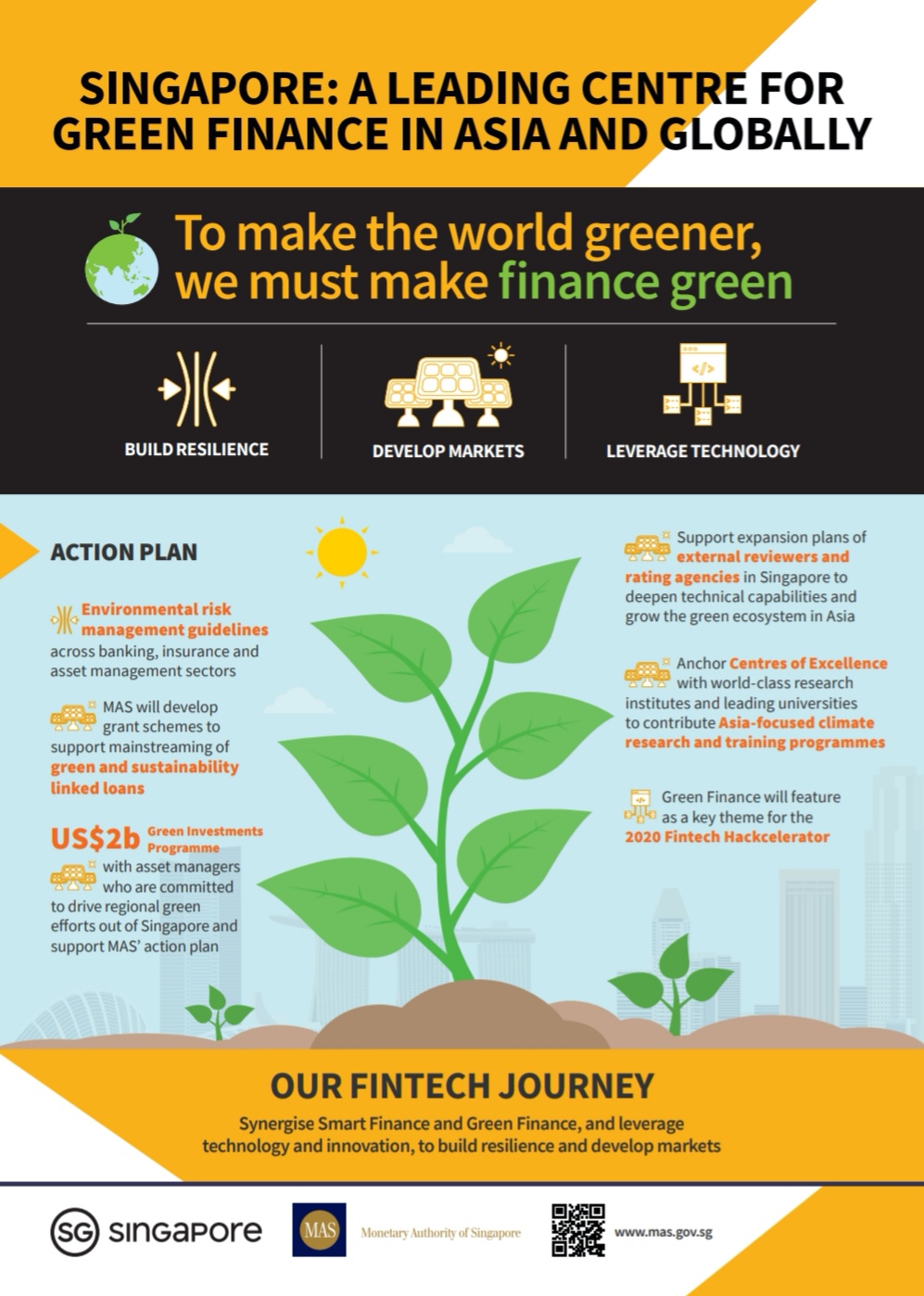
Mr Ong Ye Kung, Minister for Education and MAS Board Member, gave the keynote speech at SFF x SWITCH today (Singapore FinTech Festival and Singapore Week of Innovation and Technology).
Minister Ong shared about Singapore’s goal to be a leading centre for green finance in Asia and globally, and outlined three concrete steps that Singapore is going to take: build financial system resilience to environmental risks; develop green finance solutions and markets; and leverage innovation and technology. With Singapore’s experience in financing the region and capabilities in technology, we can make a unique contribution.
Build Financial System Resilience to Environmental Risks
Climate change poses two main risks to the financial system. One is the physical risks arising from climate change itself. Damage to assets and property caused by floods and rising sea levels can result in large insurance claims and lower the collateral value of bank loans. Two, transition risks arising from policy changes, technological advances, or changes in consumer preferences. Old fossil fuel assets can become stranded, and will devalue loans and investments in the energy sector. He highlighted that these potential losses are large, and can be compounded by other risks such as deforestation, land contamination, water and air pollution, and threaten the stability of the financial system.
Therefore, our financial institutions need to build up their resilience by measuring, mitigating, and disclosing these risks. MAS will issue Environmental Risk Management (ENRM) guidelines across banking, insurance, and asset management sectors. These guidelines will set standards on governance, risk management, and disclosure, and will encourage the right-pricing of loans and investments, and thereby promote new opportunities for green investment. MAS will publish a consultation paper in Q1 2020.
Develop Green Finance Solutions and Markets
Minister Ong shared that Singapore is developing a range of green finance solutions and markets, which will promote new economic opportunities in cleantech and other growth areas.
MAS introduced a Green Bond Grant scheme two years ago. To-date, more than S$6 billion green bonds have been issued. The grant defrays the costs of external review against green bond standards. The scheme has been expanded to include social and sustainability bonds, and renamed the Sustainable Bond Grant Scheme. Singapore is also working with our ASEAN partners to develop and update the ASEAN Green Bond Standards to be in line with international green bond principles.
Banks are the main source of financing in Asia but green lending in this region is more nascent than green bonds. In the real estate sector, many developers have secured green loans from banks to develop new green buildings, install solar panels, and retrofit buildings with energy-efficient equipment. In the broader market, sustainability-linked loans are gaining traction. MAS will develop incentives to encourage growth in green and sustainability-linked loans through grant schemes to help defray costs for businesses.
In insurance, there is a need to develop new risk transfer solutions that will help meet disaster protection needs, while creating alternative investment opportunities. Singapore established the Southeast Asia Disaster Risk Insurance Facility (SEADRIF), with support from Japan and World Bank. SEADRIF provides flood risk pooling and strengthens the region’s disaster resilience. To catalyse the growth of the insurance-linked securities (ILS) market in Singapore, MAS introduced an ILS Grant Scheme last year, to fund upfront issuance costs, and will study extending it beyond end-2020.
MAS will launch a US$2 billion Green Investments Programme (GIP). Under the GIP, MAS will place funds to public market investment strategies which have a strong green focus, with asset managers who are committed to deepening green finance activities and capabilities in Singapore. MAS will also allocate US$100 million to the Bank for International Settlements’ Green Bond Fund, in support of its global green finance initiatives.
Singapore needs to build the requisite capabilities in green finance, and Minister Ong shared that we are collaborating with our universities, the Asia Sustainable Finance Initiative, and the International Finance Corporation to build up capabilities amongst financial industry professionals. MAS will develop a scheme to support external reviewers, and rating agencies who assess and certify green financing instruments, and encourage them to expand their operations here. MAS will also work towards anchoring Centres of Excellence in Singapore, to contribute to Asia-focused climate research, which can be applied in the financial sector. The Centres will support the development of innovative green finance solutions, deepen our understanding of climate risks, enhance climate risk management, and also train and groom talent in green finance.
Leverage Innovation and Technology
Singapore will harness the power of FinTech to spur green finance by: encouraging the application of platform technologies for green finance to reach a wider pool of capital and market players, and also use such technologies to connect supply chains; encouraging the development of smart algorithms, smart
contracts and distributed ledgers, to increase speed, ease and transparency of transactions; and promoting the application of Big Data and advanced modelling to measure climate and financial risks, and develop new climate risk insurance products.
Minister Ong concluded his speech by highlighting that with imagination, innovation, technology and determination, we can reconcile the two objectives of being green and pursuing growth. Part of the solution is to make finance green because finance mobilises the resources of the world. Singapore’s goal is to be a leading centre for green finance, thus helping to achieve sustainable development in Asia and globally.
Source and image credit: MAS
